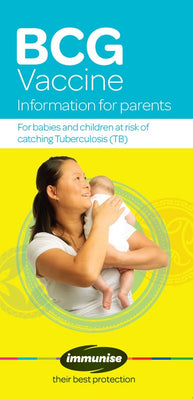BCG Vaccine: Information for Parents – English version - HE2205

Information in English for parents and caregivers about tuberculosis (TB) and the BCG vaccine.
The full resource:
For babies and children at risk of catching Tuberculosis (TB)
What is the BCG vaccine?
The BCG vaccine is an injection given to children who have a higher risk of catching TB.
The BCG vaccine helps your child’s immune system fight the bacteria that cause TB and helps stop them from getting serious TB disease.
The BCG vaccine is FREE for children under five years of age who have a higher risk of catching TB.
Who should have the BCG vaccine?
The Bacille Calmette-Guérin (BCG) vaccine is given to children under five years of age who have a higher risk of catching TB.
Your child has a higher risk of catching TB and is eligible for free BCG vaccine if he or she:
- will be living in a house or family/whānau with a person with either current TB or a past history of TB
- has one or both parents or household members or carers who (within the last five years) have lived for a period of six months or longer in a country with high rates of TB
- will be living for three months or longer (during their first five years) in a country with high rates of TB and will be likely to be exposed to those with TB.
Your midwife or doctor will advise if your child is at higher risk of catching TB. As a general indication, the following areas have high rates of TB:
- most of Africa
- much of South America
- Russia and the former Soviet states
- the Indian subcontinent
- China, including Hong Kong; Taiwan (ROC)
- South East Asia
- some Pacific nations (except the Cook Islands, Niue, Samoa, Tokelau and Tonga).
What is TB?
- TB is an infectious disease. It can cause tiredness, coughing, fever, and shortness of breath.
- TB usually affects the lungs, but it can also affect other parts of the body, such as the lymph nodes, bones, joints and kidneys. Serious TB disease can cause meningitis.
- TB spreads from person to person through coughing, spitting or sneezing into the air.
- There are about 300 cases of TB in New Zealand each year, mostly in children born overseas.
How can I protect my child from TB?
You can get your child immunised with the BCG vaccine. The vaccine helps their immune system to fight the germs that cause TB and helps stop them from getting serious TB disease.
The vaccine is given to your child as an injection in their upper arm.
When is the best time for my child to have the BCG vaccine?
- It is best for your child to have the vaccine within a few days of being born and up to six months old, but they can be vaccinated any time up to five years of age.
- If your child is older than six months, he or she will be tested to see if they have TB. Depending on the results of this test, your child may be offered the BCG vaccine.
How do I get my child vaccinated?
You can speak to your health professional to make an appointment. You can also contact your local public health service and ask to speak to the BCG nurse in your area.
What happens after the vaccination?
Reactions to the BCG vaccine are common, but serious long-term complications are rare. Most children develop a sore at the injection site. Once healed, the sore may leave a small scar. Please refer to HE2226: BCG Vaccine: After care for Parents for more information.
- In 1 to 6 weeks, a small red blister may appear where the injection was given.
- After 6 to 12 weeks, the blister may turn into a small, weeping sore. If this happens, cover the site with gauze to allow air to get in. Do not use sticking plasters.
- The sore may take up to three months to heal, and may leave a small scar. This is normal.
How effective is the vaccine?
While BCG vaccine does not prevent infection with the bacteria that cause TB, it does help stop children from getting serious TB disease.
How long does the vaccine protection last?
The duration of protection is unknown, possibly 10 to 15 years, but it may be much longer for some people.
For more information
Visit the Ministry of Health website.
Code: HE2205.